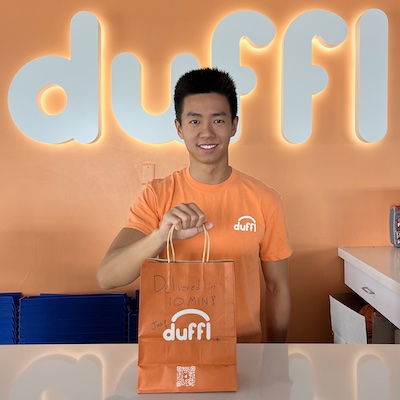Quick commerce grocery delivery companies are having a moment, and not necessarily a good one.
An industry that was on fire at the beginning of the global pandemic, mainly due to people forgoing IRL grocery shopping, has slowed as shoppers returned to brick-and-mortar stores.
As a result, several so-called q-commerce companies pumped the brakes. Getir said it would acquire competitor Gorillas and plans to inject $100 million into the company to help it out. In May, Getir announced layoffs. Gopuff announced plans to pull back in Europe, while JOKR left the U.S. and abandoned two Latin American markets as well. Perhaps most notably, Instacart paused its IPO.
While these kinds of announcements became more frequent this year, Duffl co-founder and CEO David Lin believes his quick commerce startup is an outlier in the sector.

How, you ask? By tapping into a model that focuses on 10-minute delivery of higher-margin goods, like snacks and convenience items, via e-scooter in more dense areas, enabling college students, called “Admirals,” to lead and run their own seven-figure businesses on campus.
That strategy has paid off so far: Duffl went through Y Combinator in Winter 2020 and has since raised over $13 million, including a $12 million Series A, led by Volition Capital in October 2021.
Duffl started off at UCLA, where Lin was an undergrad, and is now on the campuses of Arizona State University, University of Arizona and University of Texas, some of which are already cash positive. Admirals and their employees fielded 35,000 orders in September from 11,000 students across those campuses and managed 69% growth in new customers from referrals during the same month, Lin said.
He spoke with TechCrunch about how he’s made quick commerce work for Duffl while others struggled. The following has been lightly edited for length and clarity.
We’ve seen some quick commerce companies struggle lately. What are the challenges to this market and how have some companies gotten it wrong?
It’s certainly a difficult time for everyone, but especially players in this space, and in a down market, where you’re fundamentally dealing with low-gross-margin products, like groceries, produce and perishables. In addition, dealing with such a small time frame for delivery, you run into a lot of labor-related expenses, like transport, pick and pack costs, insurance and real estate overhead, that are very difficult to scale.
It sounds like it has much to do with the way a delivery company sets up its business model, correct?
Certainly. I would say that history doesn’t necessarily repeat itself, but it does rhyme. I started doing this in 2018, and it was quite interesting to watch the evolution through the pandemic.
Some companies, like Kozmo, tried to bring 15-minute grocery deliveries online in the 1990s and failed due to lack of profitability in the dot-com bust. It was essentially the dilemma of having a bunch of giant warehouses full of perishable inventory and no demand to back it up. At the start of the pandemic, I saw that happening with companies, like Gorillas and JOKR and 44 other smaller players coming from every geography around the world.
The first mistake that people make is trying to do groceries. You’re dealing with low-gross-margin goods, like milk, eggs and daily staples, and you try to combine that with 10- to 15-minute delivery times, and that is when it becomes really difficult. If labor cost is 30%, and your gross profit is 30%, you already are net zero before you’re talking about all the overhead at the store level.
We decided not to do groceries and focus on convenience and high-margin products, like snacks, ice cream and energy drinks — things that people want in the moment and are willing to pay a small premium for.
Companies in this space grabbed billions of dollars in venture capital. Why was this such a hot area for investors?
Definitely because of the demand. It’s very difficult, as an investor, to overlook companies that are growing 300% to 500% year over year and scaling from zero to $300 million in the pipeline in a matter of a couple of months. It’s kind of amazing.
But then you look under the hood and realize that this is people giving away $2 to make $1. Venture capital is a difficult job, but in the past year has become very, very frothy. People were not doing diligence and were just going with the pack as there was so much momentum being built up. The pandemic was a perfect storm where even Amazon and Shopify experienced the same spikes, opened new warehouses and thought that their business was going to look different. Now that they have reverted back to the mean, they’re undergoing layoffs. It’s a very difficult adjustment period.
There is a lot of competition in this space. What is Duffl doing right and how is it differentiating itself?
In recent months, competition has slowed down a little bit, given how difficult it is for everyone to scale, and marketing spend by these other companies has decreased noticeably. We’ve never really spent anything on marketing, and that’s been beneficial for us. As to the acquisition piece, a good example is DoorDash. Early on, it focused on the suburbs, where UberEats, Caviar and Postmates focused on metropolitan cities. At the time, it was a very controversial opinion, but then they realized there was actually sufficient density in those areas to justify becoming a mainstream player, and that’s how they dominated the market.
By making the strategic decision to focus on college campuses, partially because I was still in school myself, it’s the same population density of a city. New York City has something like 27,000 people per square mile, and UCLA, at its full peak, has 80,000 people per square mile. You’re talking about so many kids packed into a very small area and that allows for labor efficiency. I think the average delivery is three to 3.5 orders per hour. Gorillas and Gopuff can do like three to four. However, we’re doing an average of eight to 10 orders per hour per racer. Our theoretical limit is something crazy, like 27 orders.
With e-scooters, you don’t need to park, and you can keep them on the elevator. In addition, students have institutional knowledge of the grounds — they know every doorway, every alleyway by heart. Plus, on college campuses, they want to support their friends.
How Duffl is enabling college students to run and manage their own businesses?
It’s a bit of an outlandish idea, but our mission is to empower students to serve each other. I knew a lot about UCLA, but I don’t know about other campuses, so we had to find students there who did. They are the CEOs of their store. They decide all the hiring and firing decisions. They manage a seven-figure P&L, the orders and the supply chain. Most of our code base is actually tools we built for that model, like scheduling, leaderboards, timecards, order management and supply chain algorithms.
We discussed how some companies might be doing it wrong, but not all companies are doing badly. We recently reported on Oda in Norway, which announced a nine-figure venture round. In this economy, what will it take for companies to continue to attract investors?
I’m so happy to hear that there’s still investments. I do think this model works where there is population density and established channels of distribution. What happens in these European and Asian cities is that there’s so much population density. I live in Los Angeles, and everything is so far away, and the car is the center of life.
You’ve said Duffl is probably one of the few dark store players to achieve store-level cash-flow breakeven. How have you been able to avoid terrible unit economics?
We were just lucky in that we were in the right place at the right time. I was an economics student before I switched to philosophy, and they taught us about, “What are the price determinants of elasticity of demand?” and “whether a good is a luxury or a necessity.” “How expensive is it and how much time has elapsed?”
If you want to charge more for a product, you need to make sure that there’s not that many substitutes that people need, that it’s relatively cheap from an absolute dollar basis and that time is of the essence. That’s the superpower that we’ve discovered. We see a direct correlation between stress level around midterms and finals and number of orders, so we’re really just providing a service where students get what they want and save time.
You’re planning a Series B for 2023. Why is now a good time to go after new capital?
We are in a very unique position where we have a good amount of runway to last us through what I would suspect will be a recession. A year and a half or more of runway is necessary for any startup, especially one of the underdogs. However, with this new round, we’re looking for more strategic investors from a supply chain or distribution perspective. We have cash-positive stores at four of our markets, and that’s really difficult, and what we focused on rather than top-line growth for the past year. What would get us to the next level is if we could shave off 5% to 10% of our gross margin, for example, by working with someone at a volume who will enable us to lower costs and prove to the world that this can work in the U.S., and that we can scale up every university. We’re also very close to having the number of stores needed to be cash-flow breakeven, as a business, next year.
What does Instacart’s supposedly delayed IPO teach us about how unicorns think?































Comment